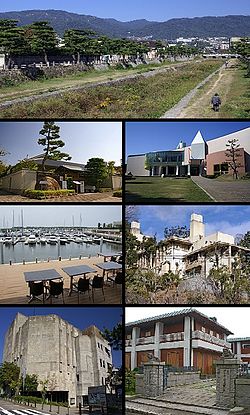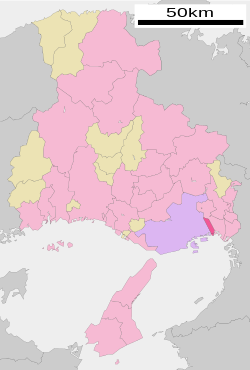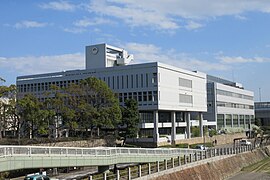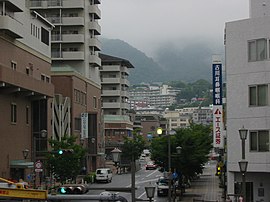Ashiya, Hyōgo
Ashiya 芦屋市 | |
|---|---|
 Clockwise from top, Ashiya River, Ashiya Municipal Museum Art, Yodoko Guest House, Emba Museum of Modern Art, Ashiya Citizen Center, Bell Port Ashiya, Jyunichiro Tanizaki Memorial Hall | |
 Location of Ashiya in Hyōgo Prefecture | |
 | |
| Coordinates: 34°43′40″N 135°18′12″E / 34.72778°N 135.30333°E | |
| Country | Japan |
| Region | Kansai |
| Prefecture | Hyōgo |
| Government | |
| • Mayor | Ryōsuke Takashima (from May 1, 2023) |
| Area | |
• Total | 18.47 km2 (7.13 sq mi) |
| Population (June 1, 2024)[1] | |
• Total | 92,976 |
| • Density | 5,000/km2 (13,000/sq mi) |
| Time zone | UTC+09:00 (JST) |
| City hall address | 7-6 Seidōchō, Ashiya-shi, Hyōgo-ken 659-8501 |
| Website | Official website |
| Symbols | |
| Flower | Kobano-mitsuba-tsutsuji |
| Tree | Japanese Black Pine |



Ashiya (芦屋市, Ashiya-shi) is a city in Hyōgo Prefecture, Japan. As of 1 June 2024, the city had an estimated population of 92,976 in 43,229 households and a population density of 5,000 persons per km2.[1] The total area of the city is 53.44 square kilometres (20.63 sq mi). It has a reputation as a high-end residential area.
Geography
Ashiya is located between Kobe and Nishinomiya, and is the second smallest municipality in Hyōgo Prefecture. The ground gentle slopes from the Rokko Mountains in the north to Osaka Bay in the south.
Neighboring municipalities
Hyōgo Prefecture
Climate
Ashiya has a humid subtropical climate (Köppen Cfa) characterized by warm summers and cool winters with light snowfall. The average annual temperature in Ashiya is 14.6 °C. The average annual rainfall is 1,578 mm with September as the wettest month. The temperatures are highest on average in August, at around 26.4 °C (79.5 °F), and lowest in January, at around 3.3 °C (37.9 °F).[2]
Demographics
Per Japanese census data,[3] the population of Ashiya has been increasing since the 1920s.
| Year | Pop. | ±% |
|---|---|---|
| 1920 | 11,151 | — |
| 1930 | 28,404 | +154.7% |
| 1940 | 39,137 | +37.8% |
| 1950 | 42,951 | +9.7% |
| 1960 | 57,050 | +32.8% |
| 1970 | 70,938 | +24.3% |
| 1980 | 81,745 | +15.2% |
| 1990 | 87,524 | +7.1% |
| 2000 | 83,834 | −4.2% |
| 2010 | 93,238 | +11.2% |
History
The area of Ashiya was part of ancient Settsu Province and was mostly tenryō territory under direct control the Tokugawa shogunate during the Edo Period. Ashiya was established in 1871 as a township in Hyōgo Prefecture and was designated part of Seido village (精道村) on April 1, 1889, with the creation of the modern municipalities system. In the early 1900s, it was designated as an urban planning area and became one of the centers of the Hanshinkan Modernism movement in terms of architecture and culture. This led to the building of large single-family homes with tennis courts, swimming pools, and tea houses, etc. along the hills overlooking Osaka Bay. Seido was promoted to city status on November 10, 1940, changing its name to "Ashiya".
In 1945, the City of Ashiya prohibited the operation of pachinko parlors, gambling and entertainment facilities as well as small factories. This ordinance includes prohibitions on rooftop advertisements, advertising balloons, and a complete ban on flashing lights. Those laws still stand and there is no other municipal government with similar regulations in Japan. In 1991, Ashiya residents elected Harue Kitamura as the first woman to hold the office of mayor of a city in Japan. Kitamura was mayor when Ashiya suffered major damage during the Kobe earthquake on January 17, 1995. Over 50% of the urban area of Ashiya was destroyed by the earthquake, and there were 444 fatalities. In 2023, Ashiya residents elected 26 year old Ryōsuke Takashima, making him the youngest mayor ever in Japan.[4]
Government
Ashiya has a mayor-council form of government with a directly elected mayor and a unicameral city council of 21 members. Ashiya contributes one member to the Hyōgo Prefectural Assembly. In terms of national politics, the city is part of Hyōgo 7th districts of the lower house of the Diet of Japan.
Economy
Ashiya is primarily a residential city and commuter town for the Osaka and Kobe metropoles.
Education
Ashiya has eight public elementary schools and three public middle schools operated by the city government, and two public high schools operated by the Hyōgo Prefectural Board of Education. There are two private middle schools and three private high schools. In addition, the prefecture also operates one public middle school and one special education school for the handicapped.
Transportation
Railways
The first railway line to the city was completed in 1905.[5] Central Ashiya is served by JR West Ashiya Station. Hanshin Electric Railway Ashiya Station and Uchide Station serve the southern part of the city, while Hankyu Railway Ashiyagawa Station is located in the quieter northern area.
![]() Hankyu - Hankyū Kōbe Main Line
Hankyu - Hankyū Kōbe Main Line
![]() Hanshin Electric Railway - Hanshin Main Line
Hanshin Electric Railway - Hanshin Main Line
Highways
Sister cities
 Montebello, California, United States
Montebello, California, United States
A sister city agreement was signed between Ashiya and Montebello, California on May 24, 1961. Student Ambassadors are chosen to travel to Montebello every year since 1964.[6]
Local attractions
- Yodokō Guest House, a house designed by Frank Lloyd Wright located on a hill overlooking Hankyu Ashiyagawa Station and Osaka Bay. It was completed in 1924 as a residence for the Yamamura family, founders of the famous sake company "Sakuramasamune" (櫻正宗). It is open for tours. Ashiya also features the house of Hiroko Koshino, The Koshino House at about 600 meters altitude in the Okuike affluent residential area of the city, designed by Pritzker Architecture Prize winner Tadao Ando.[citation needed]
Culture and people
Persons of note associated with Ashiya include Jirō Shirasu ("the man who reproached MacArthur"), Ryōji Noyori (Nobel prize winner), Takashi Asahina (conductor), Junichirō Tanizaki (writer), Haruki Murakami (writer), Yuriko Koike (House of Representatives member), Yōko Ogawa (writer), Tsumasaburō Bandō (kabuki actor), Morinosuke Kawaguchi (futurist), Tsuruko Yamazaki (artist),[7] Takuya Kuroda (jazz trumpeter and arranger), Takakeishō Mitsunobu (professional sumo wrestler), and Tomiko Itooka (supercentenarian).
The city is the main setting in Jun'ichiro Tanizaki's novel Sasameyuki (細雪) (The Makioka Sisters, Eng. trans. Edward G. Seidensticker).
References
- ^ a b "芦屋の統計資料:毎月人口(町別人口及び世帯数) 令和3年" [Ashiya statistical data: Monthly population (population by town and number of households) Reiwa 3]. Ashiya City. Archived from the original on 2011-04-10. Retrieved 2021-03-31.
- ^ "Ashiya climate: Average Temperature by month, Ashiya water temperature". en.climate-data.org.
- ^ "Hyōgo (Japan): Cities, Towns and Villages in Prefecture - Population Statistics, Charts and Map". www.citypopulation.de.
- ^ Norihiko Shinjo (2023-04-24). "Ashiya elects 26-year-old mayor, youngest ever in Japan". Asahi Shimbun.
- ^ "Ashiya" in The New Encyclopædia Britannica. Chicago: Encyclopædia Britannica Inc., 15th edn., 1992, Vol. 1, p. 626.
- ^ "Montebello, California". Ashiya City. Archived from the original on August 19, 2014. Retrieved August 11, 2013.
- ^ "Tsuruko Yamazaki (1925–2019)". www.artforum.com. 13 June 2019. Retrieved 2020-01-08.
External links
- Official website
 (in Japanese)
(in Japanese) - Ashiya-People.com Local media website (in Japanese)



